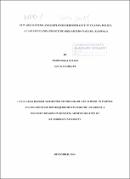| dc.contributor.author | Wodumaga, Julian | |
| dc.date.accessioned | 2022-09-14T14:43:09Z | |
| dc.date.available | 2022-09-14T14:43:09Z | |
| dc.date.issued | 2014-12 | |
| dc.identifier.citation | Wodumaga, Julian(2014) Reward systems and employee performance in Uganda police, a case of Uganda police headquarters-Naguru, Kampala | en_US |
| dc.identifier.uri | https://hdl.handle.net/20.500.12504/1100 | |
| dc.description | x, 74 p. : ill. ; | en_US |
| dc.description.abstract | The study was entitled "Reward Systems and Employee Perfom1ance in Uganda Police, a case of
Police Headquarters- Naguru, Kampala". This study examined the relationship between the
independent and dependent variables. This was initiated because, despite efforts by the
government of Uganda through the managers in police to invest in developing its employees,
improve their moral and knowledge base, through remunerations such as good pay and other
non monetary rewards, there is still decreasing employee performance, slow speed of service,
laxity in job accomplishment and inefficiency of service in the Uganda police force. The guiding
objectives of the study were to: examine the extent to which payment influences job
accomplishment; assess the effectiveness of promotions on the quality of services delivery and evaluate the ex tent to which employee career advancement influence the quality of services
delivery red in Uganda police. This study adopted a cross sectional survey design, in which both
qualitative and quantitative data was u ~ed. The study population comprised of accessible 150
employees according to police force (Uganda) and a sample size of 132 respondents was selected
non top management, middle level and junior officers. The key findings were: there was a
negative correlation between payments and job accomplishment ( -0.359). This meant that
payments did not influence job accomplishment in Uganda police force. The study indicated a
positive correlation between promotions and service quality to be 0.372. Promotions were so
important in the bid to improve quality of service delivery. Any improvements in the criteria of
awarding promotions could lead to substantial improvement in the quality of service delivery.
The study finally showed a linear relationship between employee career advancement and
service quality with an overall, R square value of .374. This led to a conclusion that employee
career advancement contributed 0.374 variations in service quality. Thus any improvements in
the above promotions and career advancement would lead to 37.4% improvements in service
quality. This again means that there is a multiplicity of factors other than rewards that are
responsible for service quality in Uganda police force and should therefore be attended to. The
study recommends that there should be a well streamlined payment system; alignment between
payments and job accomplishment; use of a mix of financial and non-financial rewards; officers
should be given chance to indicate how best they should be rewarded; employees should be
evaluate and appraised periodically to ensure that any improvements in performance are
rewarded; police needs to be sensitized in 'order to realize that their work should not be based on
pay only. | en_US |
| dc.language.iso | en | en_US |
| dc.publisher | Kyambogo University[Unpublished work] | en_US |
| dc.subject | Reward systems | en_US |
| dc.subject | Employee performance | en_US |
| dc.subject | Uganda police | en_US |
| dc.title | Reward systems and employee performance in Uganda police, a case of Uganda police headquarters-Naguru, Kampala | en_US |
| dc.type | Thesis | en_US |

